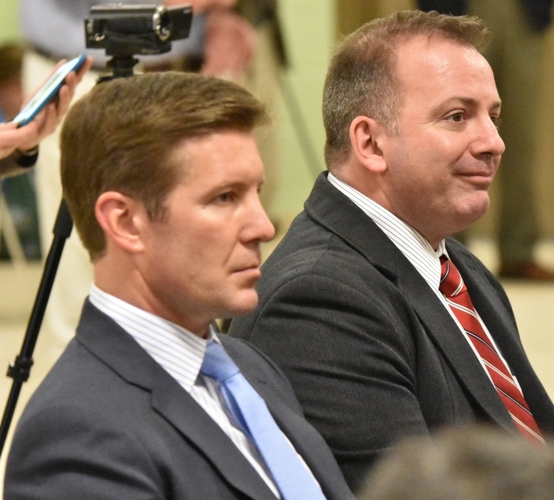VERNON — Having faced a long list of questions at a recent public meeting, a key player in the proposed Vermont Yankee decommissioning project is responding in writing.
Areva Nuclear Materials - a partner of NorthStar Group Services, the nuclear plant's proposed buyer - has issued online responses to questions about the schedule, cost, and radiological safety of the cleanup job.
Areva's answers aren't likely to squelch a debate about NorthStar's ability to carry out its accelerated decommissioning plans.
But spokesman Curtis Roberts said the company's intent is “to provide a public, authoritative, and consolidated source for answering questions and clearing up misunderstandings about the Vermont Yankee decommissioning proposal and our team's expertise.”
Entergy, which stopped power production at Vermont Yankee in December 2014, announced plans last November to sell the Vernon site and its decommissioning trust fund to New York-based NorthStar by the end of 2018.
NorthStar is promising to decommission and restore most of the property by 2030 at the latest, and possibly as early as 2026. That's much quicker than Entergy's plan, which had called for an extended period of dormancy followed by a decommissioning project ending in 2075.
Complicated process
The sale requires approval by both the federal Nuclear Regulatory Commission and the Vermont Public Service Board.
Those regulatory processes involve large filings, some of which are highly technical. As evidence of that, attorneys for Entergy and NorthStar recently received extra time from the Public Service Board to respond to discovery questions that they described as “extremely voluminous, totaling nearly 1,000 requests.”
The two companies also have heard many questions at public meetings. Some who spoke at a public hearing in Vernon earlier this month wondered whether NorthStar's plans are too good to be true.
Areva also took some heat, with several meeting attendees asking about the company's regulatory and financial issues overseas. That's one of the topics included in Areva's new “frequently asked questions,” posted on a Vermont Yankee decommissioning page on the company's website.
The information is available at us.areva.com/decomVY.
Washington, D.C.-based Areva Nuclear Materials and its parent company, New Areva, “have no financial liability or operational links to any reactor construction or servicing projects including the projects in Finland, France, or China, nor any association with operations at Creusot Forge,” company officials wrote.
Areva's Creusot Forge foundry unit in France came under investigation earlier this year for quality issues and suspected document falsification.
The company cites the “solid financial position” of New Areva and Areva Nuclear Materials, including the French government's “stake of more than two-thirds of New Areva's capital.”
Other issues addressed
Other issues covered by the company include:
• Administrators say both Areva and NorthStar have decades of nuclear experience, though Areva's is far more extensive. The company's resume includes work on the Maine Yankee, Yankee Rowe, and Connecticut Yankee nuclear decommissioning projects.
At Vermont Yankee, Areva would be responsible for dismantling the plant's reactor vessel and managing spent nuclear fuel. That would happen under a “fixed-price” contract that “cannot result in cost escalations to the project,” the company says.
• There have been repeated questions about how and why NorthStar can undertake an accelerated decommissioning project.
Areva's new document again cites the decommissioning expertise of NorthStar and its partners, which include a Texas company that operates a disposal site for low-level nuclear waste.
And, as a “self-performing owner, NorthStar avoids the additional expenses in the original owner's plan to delegate the management and oversight of the project to a third party,” Areva says.
• The companies also are reiterating their pledge to adhere to a tight budget for each portion of the decommissioning job: They say any cost overruns won't come out of Vermont Yankee's decommissioning trust fund, “so the cost risk is carried by the contractor.”
• NorthStar and its partners say they are “sensitive” to safety concerns about the nearby Vernon Elementary School - another question that came up during the April 6 hearing held at the school.
The companies say they will use “proven methods to ensure continued safety and protection” of plant workers and the public. Those include “using the facility's existing barriers, such as performing work inside the containment building, using remotely operated machinery, and additional protection strategies where needed.”
• In addition to clearing much of the site for potential redevelopment, NorthStar's earlier decommissioning plan also creates “jobs and economic activity many years sooner, with benefits for the local economy,” Areva says.
Decommissioning will involve 100 to 200 workers at any given time, though more staff might be required at certain points, the company says.
When hiring subcontractors, “local firms will be given consideration,” administrators added.
Areva's new Vermont Yankee web page also includes a place to submit questions to the company “in case there's a topic we haven't covered at this stage in the process,” Roberts said.
